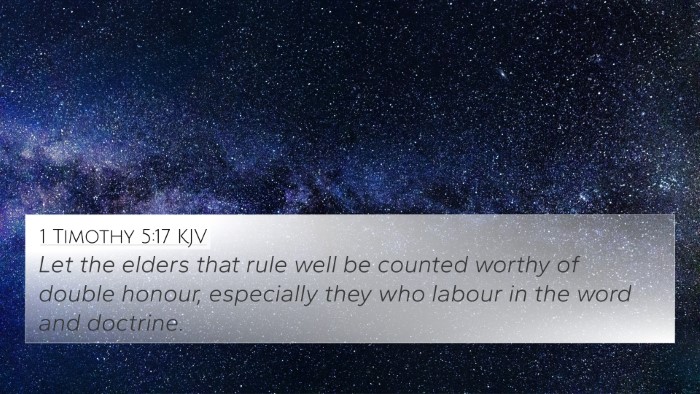Understanding 1 Corinthians 9:14
1 Corinthians 9:14 states: "Even so hath the Lord ordained that they which preach the gospel should live of the gospel." This verse emphasizes the principle that those who minister the word of God should be compensated for their labor in sharing the gospel. To explore a deeper meaning, we can draw insights from various public domain commentaries.
Insights from Public Domain Commentaries
Matthew Henry's Commentary reveals that this verse highlights a divine ordination concerning the support of gospel ministers. Henry emphasizes that the Lord has established this system not only for the sake of the ministers themselves but also for the benefit of the Church. The entire community is encouraged to support those who lead them in spiritual matters, thus fostering a relationship of mutual benefit.
Albert Barnes' Notes expound on the idea that living of the gospel doesn't only pertain to material support but also underscores the spiritual authority and responsibility imparted upon those who preach. Barnes illustrates that by providing for their spiritual leaders, congregations participate in the dissemination of the gospel and share in its blessings.
Adam Clarke's Commentary further elaborates on the sociocultural aspect of this verse, referring to the traditions of the time when ministers were often sustained by the contributions of their followers. Clarke emphasizes the notion that the laborer is worthy of his hire, reflecting a broader biblical theme where fair treatment and support are integral to community life.
Connection to Other Bible Verses
1 Corinthians 9:14 connects with several key Bible verses that enhance our understanding of ministerial support and the relationship between clergy and laity. Here are some cross-references:
- Luke 10:7: "And in the same house remain, eating and drinking such things as they give: for the laborer is worthy of his hire." This verse echoes the sentiment that those who serve in ministry deserve commensurate support.
- Galatians 6:6: "Let him that is taught in the word communicate unto him that teacheth in all good things." This reinforces the idea of sharing material goods with those who provide spiritual teaching.
- 1 Timothy 5:17-18: "Let the elders that rule well be counted worthy of double honour, especially they who labour in the word and doctrine." This further emphasizes the responsibility of the church to honor its leaders.
- Acts 20:35: "It is more blessed to give than to receive." A reflection on the blessedness of supporting those in ministry.
- Philippians 4:15-16: "Now ye Philippians know also, that in the beginning of the gospel, when I departed from Macedonia, no church communicated with me as concerning giving and receiving, but ye only." Paul commends the Philippians for their support.
- Matthew 10:10: "Nor scrip for your journey, neither two coats, neither shoes, nor yet staves: for the workman is worthy of his meat." This illustrates the expectation of provision for those who preach.
- 2 Corinthians 9:7: "Every man according as he purposeth in his heart, so let him give; not grudgingly, or of necessity: for God loveth a cheerful giver." This verse speaks to the attitude of believers towards giving.
- Deuteronomy 25:4: "Thou shalt not muzzle the ox when he treadeth out the corn." This Old Testament law signifies the importance of not withholding support from those who labor.
- Romans 15:27: "It hath pleased them verily; and their debtors they are. For if the Gentiles have been made partakers of their spiritual things, their duty is also to minister unto them in carnal things." This encapsulates the reciprocal nature of spiritual and material support.
- Hebrews 13:17: "Obey them that have the rule over you, and submit yourselves: for they watch for your souls, as they that must give account." This verse highlights the accountability of leaders and the need for support from their followers.
Thematic Connections
Thematically, 1 Corinthians 9:14 touches on several important issues within the body of Christ:
- Support for Ministry: This principle is central to the ongoing vitality of the church and reflects God's care for His servants.
- Reciprocal Community Relationships: Encouraging a sense of giving and receiving within the context of spiritual family, enriching both parties.
- Divine Ordination: Recognizing that God has a vested interest in the well-being of His ministers and the proper functioning of the church.
- Spiritual and Material Balance: Fostering an understanding that spiritual leaders should be cared for materially to prevent undue burden while preaching the gospel.
Conclusion
In summary, 1 Corinthians 9:14 underscores the importance of supporting gospel ministers as ordained by God. Drawing from the insights of esteemed commentaries, and through various cross-references, we come to appreciate this principle's richness and relevance. This understanding invites us to delve further into the connections between Bible verses, allowing for an enriched perspective on scriptural themes, fostering healthy dialogue within the body of Christ. As we engage with these teachings, we explore not just the individual verse but the broader narrative woven throughout Scripture.







